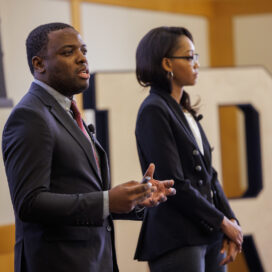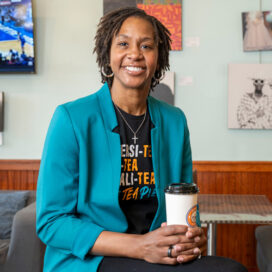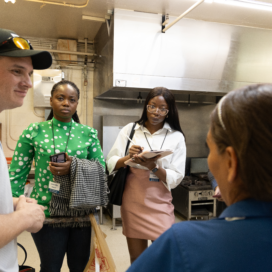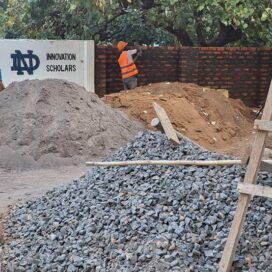Telling stories of peace
MNA student Brian Meagher has a passion for making the world a better place, and he’s doing it through storytelling.
Published: March 30, 2022 / Author: Brandi Wampler
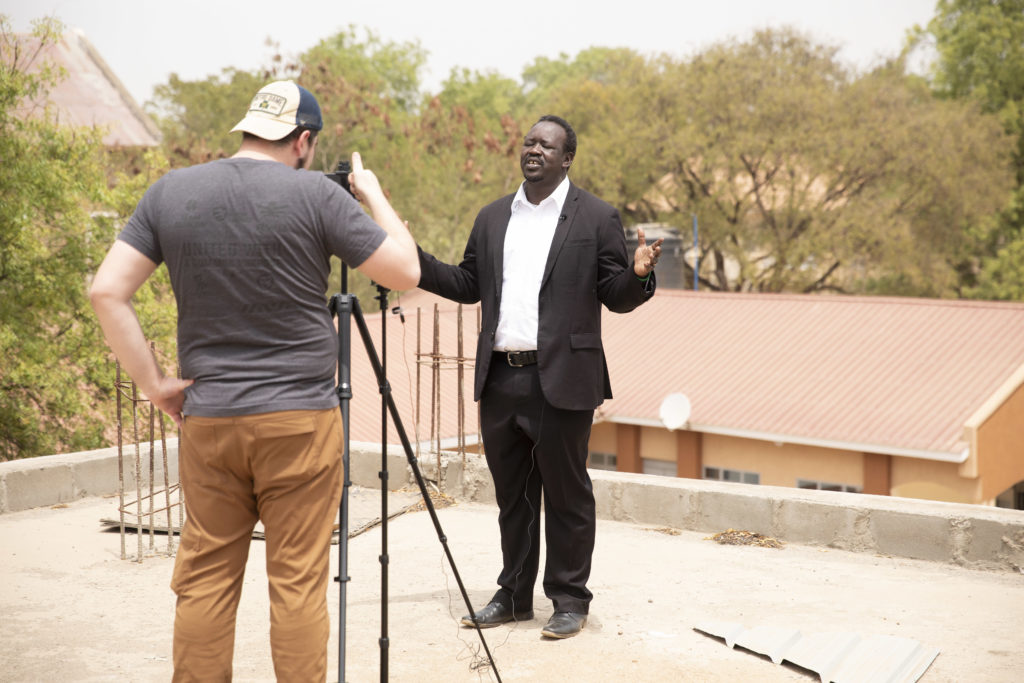
When Brian Meagher (MNA ‘22) was an undergraduate student, his favorite professor was Dr. David Rawson, who served as the U.S. Ambassador to Rwanda during Rwanda’s genocide in 1994. Meagher remembers Rawson constantly preaching peace, diplomacy and non-war solutions.
At the time, Meagher was in the Air Force ROTC at Spring Arbor University in Michigan and was wrestling with the idea of fighting as a Christian in the armed forces. Rawson acted as a mentor, discussing his experience during the Rwandan Civil War and the mental strain of it years after.
This experience was formative for Meagher. It helped him realize the impact of violence as well as the deep power that lies in forgiveness and peace. It became a major driver of why he works with nonprofits to help make the world a better place and showed him how storytelling can be used to convey the importance of their work. And, now more than ever, he’s drawn to telling stories of peace and reconciliation.
As the founder of BKM and Co., LLC, Meagher works as a nonprofit consultant that fundraises through brand development and cause marketing. His day-to-day routine requires him to come up with creative solutions, as many of the nonprofits he works with do not have the financial resources to employ a full-time fundraiser to meet their goals. Storytelling is key to his success, which has meant picking up new skills throughout his career.
For example, during the pandemic he began learning videography to better show how a client was continuing to accomplish their mission. Ever since, it’s become obvious how important film and photography are for telling his clients’ stories. In total, he has helped raise over $15 million for nonprofit organizations. So how did his journey of wanting to tell stories of peace throughout his career lead him back to college?
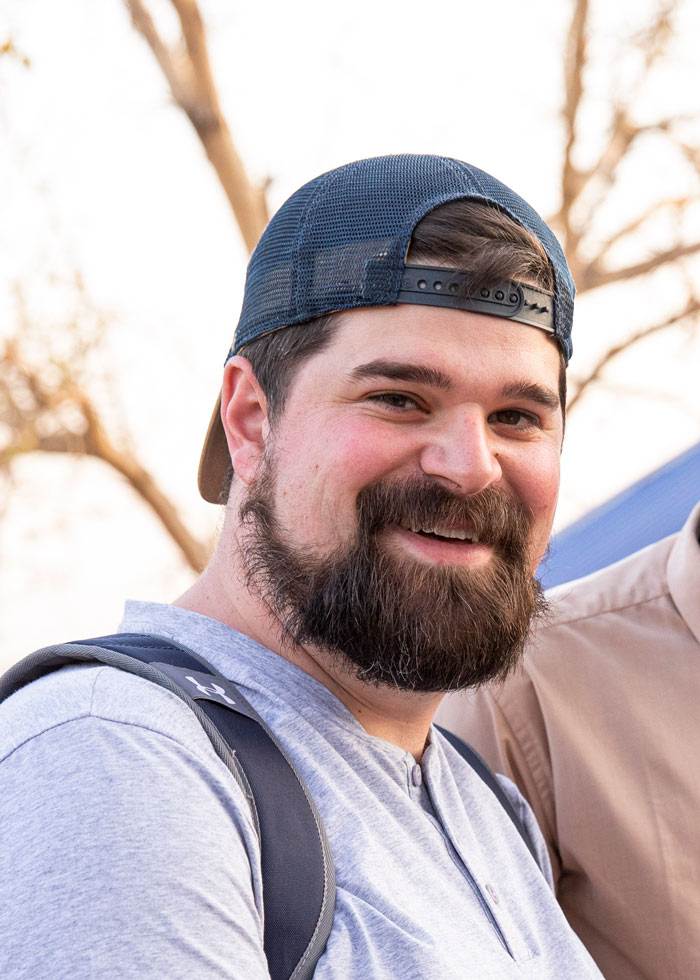
Brian Meagher (MNA ‘22)
“I applied for a job I was qualified for, was told I was a perfect fit, but I immediately got rejected.”
Meagher received an automatic rejection due to a lack of a master’s degree. It was the final nudge he needed to begin looking at Master in Nonprofit Administration programs. And even though his dad Chris Meagher (‘79) is an alum (he was recruited to play football by Dan Devine), that wasn’t what led him to choose the program at the Mendoza College of Business.
“Notre Dame, regardless of my family history, was the clear winner when it came to what the MNA program is, how it was structured and how fast I could get through it,” he explained.
As part of Meagher’s new business model, his company does not ask for payment upfront for services nor does the company take a percentage of funds raised. He explains that he aims to connect good people to good companies through business development. That new model is another reason he is grateful for his experience at Mendoza.
“I have so many more tools in my toolbox that I just didn’t have before,” said Meagher. “As someone running my own firm, I am creating something as I go and this program helped give me more of a definitive framework for how I should be making my business decisions. And that helps me better support my clients. I really have learned a lot and I really can’t take any of that for granted.”
He is already applying his newfound knowledge by helping tell the story of his friend Dr. Jacob Atem and the Southern Sudan Healthcare Organization (SSHCO).
Dr. Jacob Atem is one of the Lost Boys of Sudan, a group of approximately 20,000 boys who were forced to flee their homes and villages in southern Sudan in 1987-1991 when northern soldiers attacked. Forced to walk more than 1,000 miles, only half of the boys survived. Some were relocated to Australia and others, like Atem, were relocated to the United States.
Meagher and Atem met as undergraduate students at Spring Arbor. As an undergraduate, Atem and fellow Lost Boy Lual Awan founded SSHCO, a nonprofit that aims to provide health-care services, medical supplies and education to uplift people living in remote areas of South Sudan. This includes building new clinics and offering COVID-19 vaccinations.
While managing SSHCO, Atem went on to earn his master and doctorate degrees. Although friends, after graduation, Meagher mostly watched Atem’s life unfold from afar via social media. It had been more than a decade since they were at school together when they reconnected.
“I saw that [Atem] posted something on LinkedIn and we started talking, which led to him taking my idea of restructuring some of how SSHCO works, including how they fundraise and how volunteers work,” explained Meagher. This discussion led to Meagher coming on to support SSCHO part-time and helping the nonprofit become a more sustainably-operated organization. Now SSHCO is an official client of BKM and Co., LLC.
At the end of 2021, Atem asked Meagher and his team to go to South Sudan in February to fundraise for SSHCO and film different aspects of the trip, including Atem’s meeting with South Sudan’s Minister of Health and the dedication of a new education center. As excited as Meagher was about this opportunity, that’s not what he was most eager to capture. On this trip, Atem would also be reuniting with his sister after being separated from her 31 years prior.
Atem’s sister was abducted during the tribal conflict, and he had been looking for her ever since. As part of this trip, Atem was flying her to South Sudan’s capital city to reunite with him along with nearly dozens of relatives. At this reunification party, with more than 280 in attendance, Atem was also meeting his nephews for the first time. If that wasn’t momentous enough, the occasion also included the attendance of the captors’ of Atem’s sister as a show of reconciliation.
Reconciliation is a narrative that SSHCO is working to establish in South Sudan. Because Atem’s sister and her captors have since become friends, it was an opportunity that Atem and SSHCO thought could represent something bigger beyond their family. By filming this event, SSHCO wants to show what forgiveness looks like and how people can move forward with reconciliation for the sake of peace and happiness.
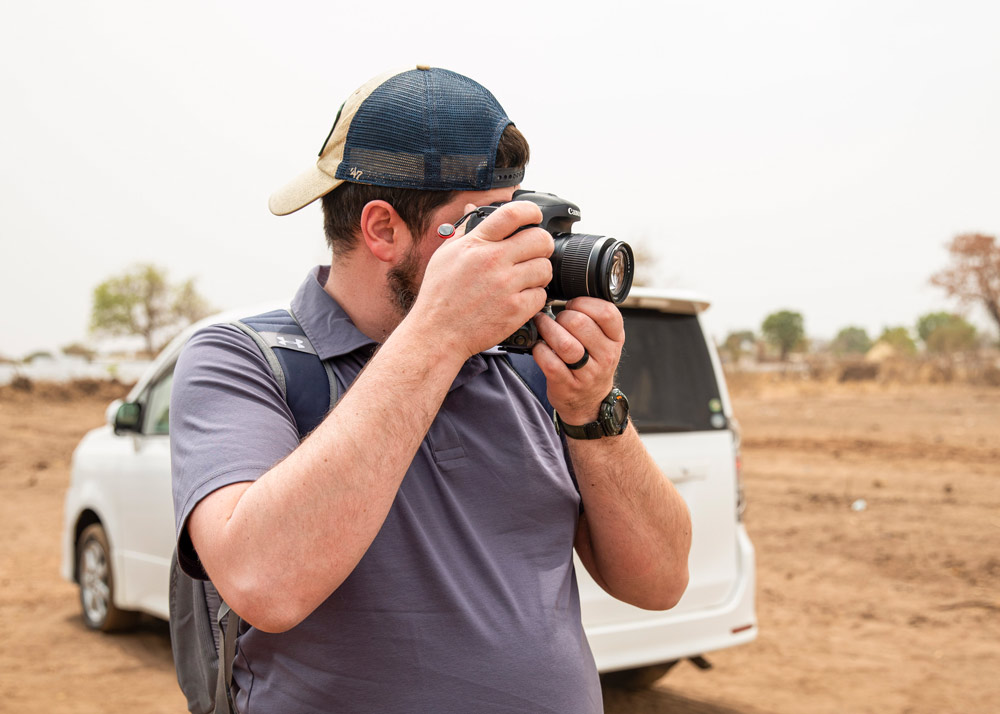
Brian Meagher (MNA ‘22)
“This is just a story that needs to be told,” said Meagher. “The fact that Jacob asked me to go on this trip is immensely humbling. It’s extraordinary to have been invited into this.”
Being able to tell the story of the reunification meant the world to Meagher, even if at times he felt like there were signs telling him not to. The coordination of travel, packing gear, planning the execution of the film, and the pressure to deliver the best story possible, was daunting. Those doubts about his decision clawed at him.
Then, some of his funding fell through.
It took several conversations with Atem and others to remind Meagher why this trip was so important, and one concept in particular stuck with him: Reconciliation is bigger than any one person, including himself.
“This is not just a story of a war-torn boy who was separated from his family, who has this incredible story. This is the story of everybody. Everybody has this hurt, everybody needs that redemption, everybody needs to reconcile and move past these grand hurts that may be so trivial for some and so deeply hurtful for others,” Meagher explained.
“This is one way to say, ‘We can go back and forgive. We can have reconciliation and peace.’ That’s why I am so drawn to this.”

